John Bolton’s controversial new memoir, “The Room Where It Happened,” focuses primarily on great-power conflicts. But less noticed in the media coverage is that it also includes a remarkably revealing full-length chapter on Venezuela.
The former national security advisor blames the spectacular failure of the April 30, 2019 coup attempt against strongman Nicolás Maduro, the heir to Hugo Chávez, on just about everyone — President Donald Trump, other senior administration officials, the Venezuelan opposition, the Cubans, and Russians — except himself.
Bolton’s narrative is laced with insights into bureaucratic decisionmaking during the Trump era. It is also highly suggestive of administration attitudes toward inter-American diplomacy. Ironically, Bolton’s narrative also indicates that President Trump, not Bolton, at times demonstrated a surer grasp of the flow of Venezuelan politics and personalities.
Bolton is a big believer in economic sanctions, even when applied unilaterally. In a version of “shock and awe,” Bolton asserts that commercial sanctions are “most effective when applied massively, swiftly and decisively.” Trump repeatedly mused about military intervention in Venezuela, but for Bolton, U.S. economic sanctions offered a more realistic and cost-effective instrument of coercion and regime change.
The Washington bureaucracy didn’t disagree with sanctions in principle, but Bolton sensed an “obstructionist, ‘not invented here’ mentality” which he attributed to the Obama years. Yet Bolton should not have been surprised that agencies sought to guard their own assets and constituencies.
Bolton focuses on the personalities of cabinet secretaries, but underlying their positions were predictable agency interests and perspectives. For example, the U.S. Treasury sought to protect the remaining assets of U.S. oil and gas investments in Venezuela and to observe legal procedures before sanctioning individuals. The State Department worried about the safety of personnel at the U.S. embassy in Caracas; some professional diplomats preferred closer cooperation with their counterparts in friendly Latin American and European governments. The Defense Department showed little interest in military interdiction of oil shipments from Venezuela to Cuba, possibly leery of escalation into a U.S.-Russian confrontation.
Bolton is also contemptuous of those fearing that tightening sanctions would impose a humanitarian toll on the Venezuelan poor. The hard-charging national security advisor ridicules the State Department for closing the U.S. embassy in Caracas (“for being so hung up on safety issues”).
In Bolton’s narrative, these legitimate agency concerns are reduced to lazy bureaucratic foot dragging, to shirking the mission. Alternatively, Bolton might have recognized that his own National Security Council-driven policies had failed to garner sufficient agency-wide buy-in, including among career officials with more in-depth knowledge of Venezuela and Latin America.
In any case, the increasingly tough sanctions were imposed, if more gradually than Bolton preferred. Why a more sudden imposition would have made a decisive difference is unclear. But sanctions are only effective in pursuit of realistic goals and imbedded in a sound strategy.
In the Bolton regime change scenario, the decisive fragmentation of the Venezuelan military was to be accompanied by a mass popular insurrection — one that, fatally, failed to materialize. For those familiar with the 1961 Bay of Pigs fiasco in Cuba, this critical intelligence failure will ring all too familiar. So too will the evident reliance on the skewed opinions of exile groups and vote-seeking U.S. politicians. According to Bolton, Senator Marco Rubio of Florida optimistically asserted that success in Venezuela would be “a big foreign-policy win.”
Bolton points fingers at “the absence of any U.S. advisors on the ground,” which he blames on the closure of Embassy Caracas and on Obama administration laxity. In fact, Hugo Chávez had expelled the U.S. military group in 2004, numbering some 40 military personnel who had served as liaisons to Venezuelan forces. Chávez’s reduction of the U.S. diplomatic footprint in Caracas came on the heels of the ill-considered U.S. public endorsement of an April 2002 coup attempt against him, long before Obama.
Bolton attributes the unanticipated cohesion of the Venezuelan military to Cuban security personnel. If so, why didn’t Bolton factor this known Cuban presence into U.S. strategy? Bolton offers no policies to drive wedges between Havana and Caracas; on the contrary, unremitting U.S. hostility toward both governments only served to tighten their bilateral relations.
Characteristically, Bolton shows little enthusiasm for ongoing diplomatic efforts to negotiate a peaceful democratic solution. Rather, Bolton worried that merely ousting Maduro would not produce a root-and-branch regime change. He disparages the region’s premier political entity, the Organization of American States, as “one of the most moribund international organizations (and that’s saying something).” He mentions the ad hoc “Lima Group” of Latin American nations, which had been actively promoting negotiations between the Maduro government and its opposition, only in passing. The administration’s own point-person for Venezuela, Elliott Abrams, seems to play little role in Bolton’s schemes.
Bolton also alleges that President Trump lacked consistency and resolve, that he “vacillated and wobbled.” Yet he quotes his boss as saying: “This is the fifth time I’ve asked for it (getting rid of the Maduro government).” Interestingly, Bolton reports that Trump worried that Maduro was “too smart and too tough”; remarkably, Trump disparaged the opposition leader, Juan Guaidó, as “the Beto O’Rourke of Venezuela,” and “He doesn’t have what it takes.” Famously confident in his intuitive judgements of character, Trump on this occasion may have been closer to the mark. At the same time, Trump assured Guaidó that he (Trump) would, in Bolton’s words, “pull off Maduro’s overthrow.”
Bolton quotes Trump claiming that Venezuela is “really part of the United States.” Presumably, Trump knows that Venezuela has no votes in the U.S. electoral college. Rather, Trump may have been reasserting the Monroe Doctrine and its (Theodore) Roosevelt Corollary, bestowing upon the United States the right to intervene in the internal affairs of neighboring states. Trump may also have been drawing attention to Venezuela’s geographic proximity (as opposed, say, to Syria) and hence heightened relevance to U.S. national interests.
Overall, the impression is that Bolton, under Trump’s direct orders, dragged a reluctant bureaucracy into a high-profile and remarkably public attempt to overthrow the entrenched government of a mid-sized power — not a tiny, malleable banana republic — in the Caribbean basin. He did so fully aware that the U.S. lacked the requisite intelligence assets on the ground, while giving excessive credence to self-interested exiles and to Republican politicians. Bolton willfully ignored his own appreciation of the international correlation of forces: that the Venezuelan regime enjoyed effective international backing and that U.S. friends and allies were not fully engaged behind his coup plot. It was a potent mix of policymaking failures, at a historic juncture — lethal to both U.S. and Venezuelan national interests. The botched intervention left the hemispheric hegemon looking both arrogant and impotent. The Venezuelan people continue to suffer under a newly fortified authoritarian regime.
The Brookings Institution is committed to quality, independence, and impact.
We are supported by a diverse array of funders. In line with our values and policies, each Brookings publication represents the sole views of its author(s).

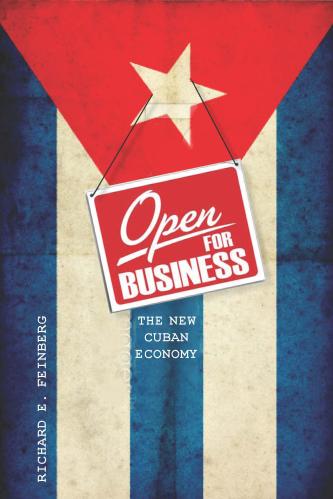
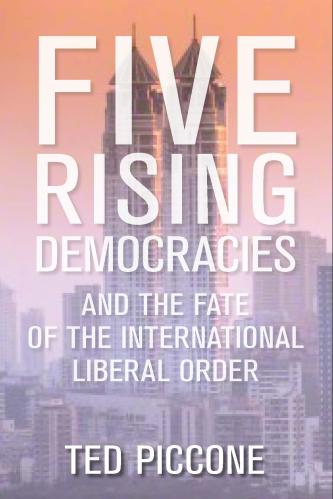
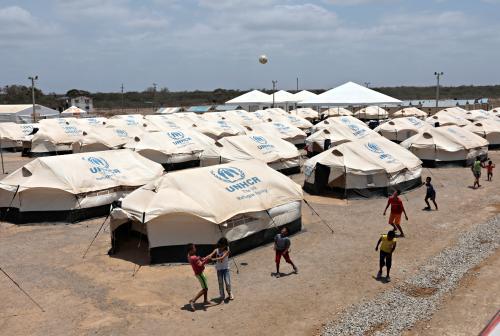
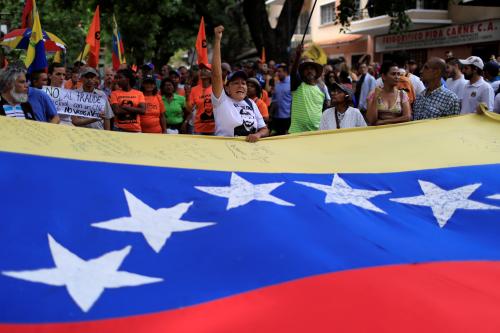
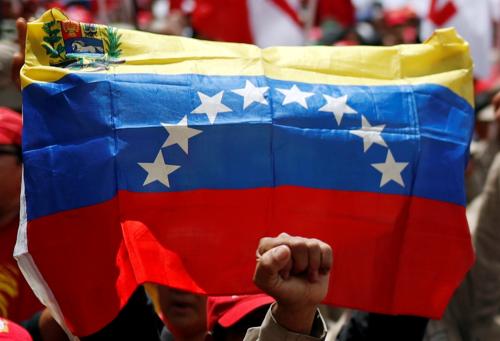

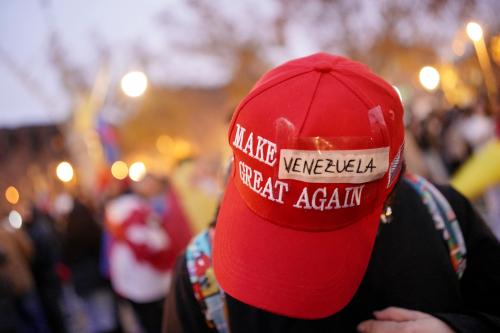

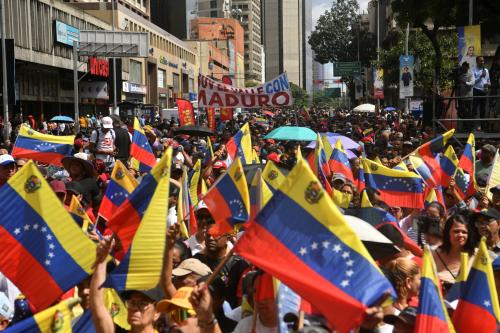
Commentary
Bolton’s book reveals a botched bureaucratic process on Venezuela
June 24, 2020